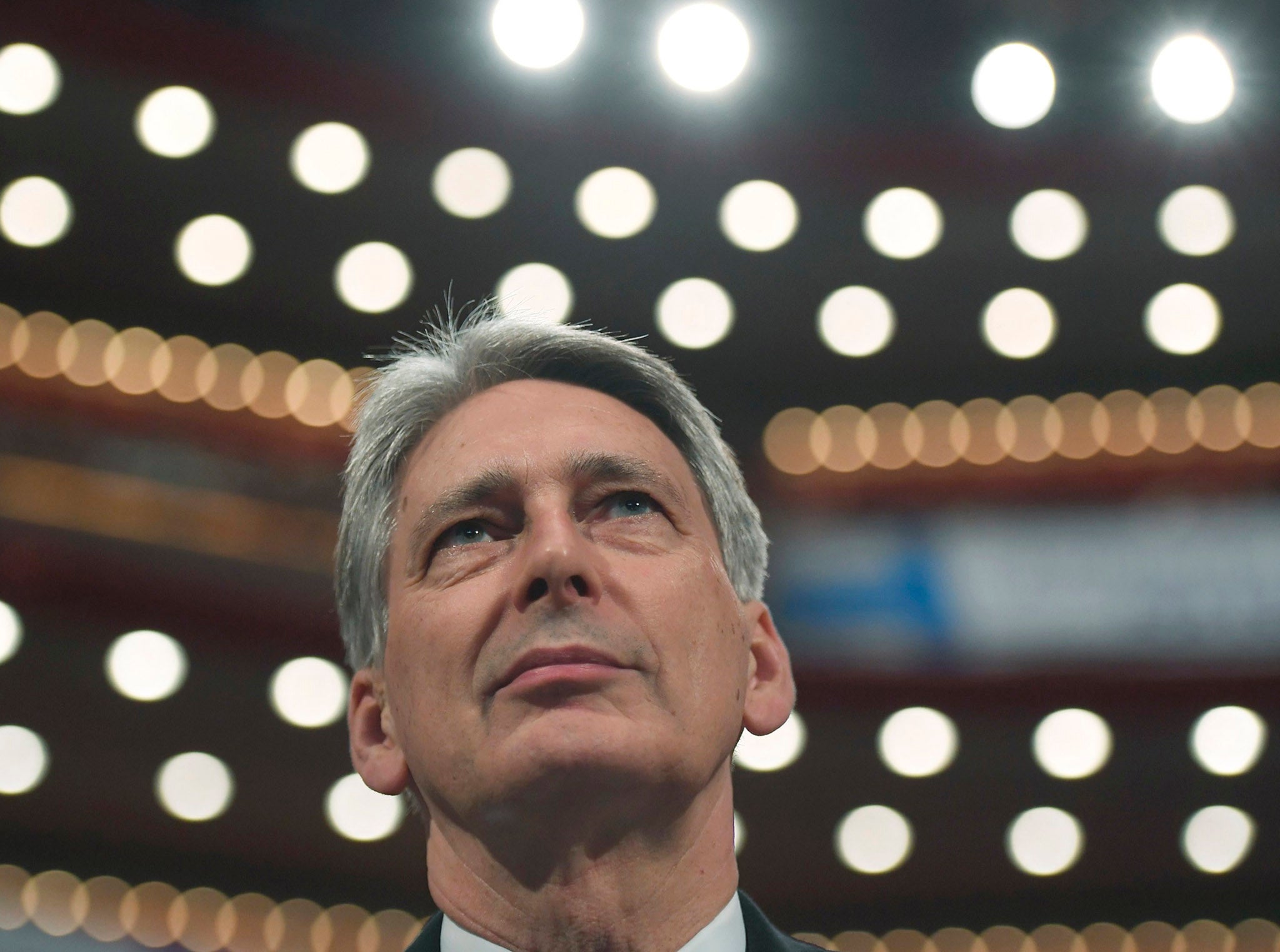Your support helps us to tell the story
From reproductive rights to climate change to Big Tech, The Independent is on the ground when the story is developing. Whether it's investigating the financials of Elon Musk's pro-Trump PAC or producing our latest documentary, 'The A Word', which shines a light on the American women fighting for reproductive rights, we know how important it is to parse out the facts from the messaging.
At such a critical moment in US history, we need reporters on the ground. Your donation allows us to keep sending journalists to speak to both sides of the story.
The Independent is trusted by Americans across the entire political spectrum. And unlike many other quality news outlets, we choose not to lock Americans out of our reporting and analysis with paywalls. We believe quality journalism should be available to everyone, paid for by those who can afford it.
Your support makes all the difference.Chancellor Philip Hammond has said he is ready to borrow money to support the British economy as he warned it is heading for a “rollercoaster” during Brexit negotiations.
Mr Hammond said the period of “turbulence and uncertainty” due to Britain’s EU withdrawal, created new circumstances that could require targeted investment from borrowing to support jobs and growth.
His warning comes the day after Theresa May confirmed that she would trigger Article 50 of the Lisbon Treaty, launching Brexit negotiations, by March 2017 and that the Government would simultaneously introduce a “Great Repeal Bill” to end the EU’s authority in the UK on day one of its departure.
Ms May's annoucement triggered a market reaction that saw the pound slump to a seven-week low - close to the levels experienced during the post-Brexit turmoil.
Speaking at the Tory Party conference, Mr Hammond unveiled a set of policies designed to shore up Britain's economy during a period of "turbulence" which he has forecast as a result of Brexit
Mr Hammond offered a new guarantee to continue payments of any multi-year EU grants secured by British businesses and organisations before withdrawal - probably in March 2019.
And he announced £220 million of new funding for the tech sector to support efforts to transform biomedical and computer innovations into marketable products.
Mr Hammond said the UK would seek the “greatest degree” of access to the single market and struck a softer tone than Theresa May on immigration, saying the Treasury is “batting” for British businesses that need overseas workers.
Mr Hammond said he will continue George Osborne’s fiscal consolidation, albeit not aiming for a surplus in 2020. But he also set out a new Conservative approach to spending.
Earlier, he told the BBC: “There is a distinction in my mind between investing in the things that will make Britain’s economy more efficient in the future, make transport systems work better, communications systems work better and simply spending more on our day to day process of government.
“We need to keep the lid on day to day spending, we need to make government more streamlined - but I do think there is a case that we should look at very carefully for targeted high value investment in our economic infrastructure.”
“We must go into this negotiating period with a realistic expectation of the turbulence that there could be during the negotiations.
“People will be speculating one day it’s all going very well, one day it’s not going as well, so we have to expect a period where confidence will go up and down - perhaps on a bit of a roller coaster, until we get to a final agreement.”
He argued Mr Osborne’s approach to fiscal discipline was right “for that time”, but on June 23 the decision of the British people changed the circumstances.
“We are going to go through a period, as I’ve said, where there will be some turbulence and uncertainty in the economy and it’s right that the government has the flexibility to be able to support the economy, to support jobs, to support economic growth during that period.”
He denied he was following a borrowing and investment plan set out by former Labour shadow chancellor Ed Balls, instead saying that he was being a “pragmatist”, before attacking Labour’s plans under Jeremy Corbyn to borrow money to pay for things that were “not the most productive forms of investment”.
Some pro-EU Tory MPs believe Mr Hammond could be a counterweight to Brexiteers in the cabinet, who favour a stronger line in negotiations over Britain’s withdrawal from the EU.
He said he hoped to be able to guarantee the rights of EU citizens living and working in the UK, and said Brexit would allow the government to have more control over immigration.
But asked whether he would be “batting” for businesses who need large numbers of foreign workers to function, he said: “Absolutely and so is the Prime Minister.
“She made very clear yesterday that we will go into these negotiations looking for the very best deal we can get for British business and for British workers.”

Join our commenting forum
Join thought-provoking conversations, follow other Independent readers and see their replies
Comments